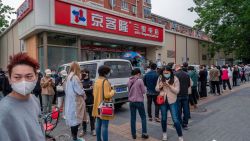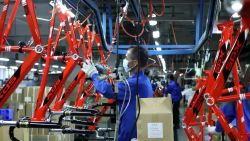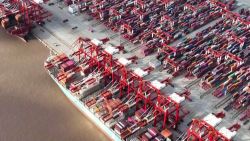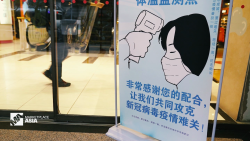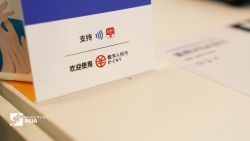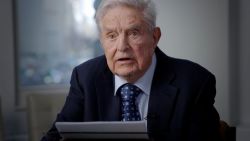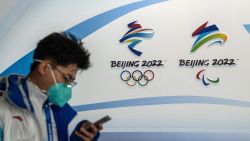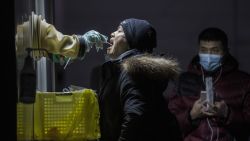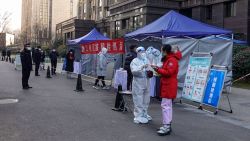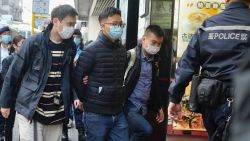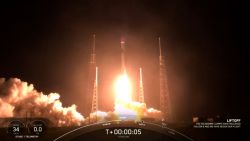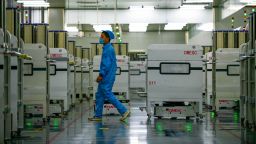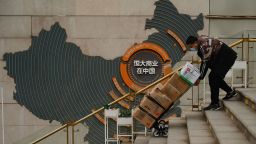A version of this story appeared in CNN’s Meanwhile in China newsletter, a three-times-a-week update exploring what you need to know about the country’s rise and how it impacts the world. Sign up here.
One year ago, Chinese leader Xi Jinping pledged to spend 2021 reining in “disorderly” private businesses that were growing too powerful and taking on too much risk.
The sweeping regulatory crackdown that followed accomplished just that, claiming some high-profile casualties along the way. But the economy is now looking a lot shakier than it was, and Xi doesn’t seem ready to rock the boat any further in the new year.
The curbs on tech, finance, education and entertainment hammered stocks and at one point wiped out trillions of dollars worth of value from Chinese companies on global markets. They also triggered huge layoffs among many companies, pressuring the job sector even as it tries to recover from the pandemic.
Further regulations on property firms that began last year have piled on the pain formajor developers who were already carrying too much debt. Real estate — which accounts for nearly a third of China’s GDP — is now in a deepening slump, with big players on the brink of collapse.
Add that to a handful of other problems in the world’s second largest economy, and you have some serious risks for the Chinese government to contend with in 2022.
Even though China emerged from 2020 as the only major economy to grow that year, growth has slowed faster than expected in 2021, weighed down by repeated Covid-19 outbreaks, supply chain disruptions, a power crunch, and the real estate crisis.
All those headaches are making Beijing reconsider its approach to policy. During a key economic meeting earlier this month, top leaders from the ruling Chinese Communist Party marked “stability” as their top priority for 2022. That’s a huge pivot from last year’s meeting, when “curbing the disorderly expansion of capital” ruled the day.
“The emphasis on stability suggests that top leaders are increasingly concerned about the risk of instability,” said Larry Hu, chief China economist at Macquarie Group, in a recent research note.
“A year of regulatory tightening has hurt the business confidence,” he added. “Now it’s the time for policymakers to back down a bit.”
China is still expected to record significant growth in 2021, despite its challenges. Many economists project growth of roughly 7.8%, well above the 6% floor that Chinese authorities set as a goal earlier this year.
But 2022 is a different story. Many major banks have cut their growth forecasts to between 4.9% and 5.5%, which would be the slowest rate of growth since 1990 — a year when international sanctions following the 1989 Tiananmen Square massacre seriously curbed economic activity.
“The Chinese government’s prior focus on regulatory and anti-monopolistic crackdowns was made possible by China’s sky-high economic growth,” said Craig Singleton, an adjunct China fellow at the Foundation for Defense of Democracies, a DC-based think tank.
“No longer, as the growth drivers of China’s economy are quickly running out of steam.”
Reining in, now winding down
The private sector crackdown started in late 2020 after Alibaba co-founder Jack Ma — easily the most recognizable of China’s business elite — blasted thecountry’s financial system during a controversial speech.
An initial public offering for his financial tech firm Ant Group was suspended soon after. Since then, life has gotten more difficult not just for Ant Group but for a bunch of other companies too.
Alibaba (BABA), Tencent (TCEHY) and others were fined or investigated over alleged anti-competitive behavior. China also took steps to punish firms over data collection and national security, including ride-hailing app Didi. That company was hammered by regulators shortly after going public on Wall Street, and eventually announced it would delist and move to Hong Kong.
There’s rationale behind Beijing’s tough stance on such companies. To Xi, reining in private enterprise is the solution to fixing longstanding concerns about consumer rights, data privacy, excess debt and economic inequality. In other words, it’s about taming the excesses of capitalism and embracing the country’s history of socialism.
But there’s a balance that has to be reached. Now faced with the prospect of an economic hard landing, Beijing appears to be backing off the tough stance it took on the private sector. Attheir recentmeeting, Chinese leaders praised the positive role that private capital plays in the economy — a stark shift of tone compared to how they were speaking a year ago.
“There will inevitably be various forms of capital in the socialist market economy,” they said in a statement after the meeting. “Capital must play its positive role as a production factor, while its negative role must be effectively controlled.”
That message suggests “the peak of regulations is behind us,” according to Hu from Macquarie. “State control is important, but the Party also doesn’t want to kill capitalism,” he added.
A big focus on jobs
As Chinese policymakers try to stabilize the economy in 2022, a few key factors will be front of mind.
Keeping unemployment low was listed, again, as the most important of a set of areas Beijing wants to focus on, according to the statement released after this month’s meeting. (Other goals include preserving food and energy security, and stabilizing supply chains.)
The emphasis on job creation comes as the outlook for employment worsens in China. Education technology companies laid off thousands of employees after the government restricted tutoring in July. Other tech firms also reportedly plan to cut staff because of the crackdown on their businesses.
The real estate crisis is a contributor as well. Cash-strapped property developers, such as massive conglomerate Evergrande, have shed jobs and offloaded assets to stay afloat.
The notoriously stable unemployment rate, released by the government every month, has stayed flat this year, only fluctuating between 4.9% and 5.5%. But repeated calls by the top leaders on various occasions to strengthen employment suggest there might be a bigger problem than the data shows.
“I think employment is now a bigger sensitivity than GDP,” said George Magnus, an associate at the China Centre at Oxford University and former chief economist for UBS.
While a slew of challenges are dragging on employment, including Covid outbreaks and the real estate crisis, Magnus said the business crackdown is a notable factor. The private sector contributes to 80% of employment, according to government statistics.
Singleton pointed out that the party “was laser focused on unemployment, fearing that mass layoffs could potentially jeopardize the party’s standing.”
Xi’s play for power will leave him a tough road ahead
At the forefront of Xi’s mind is almost certainly a desire to keep the country running steadily ahead of a historic third term in office.
It’s widely expected the Chinese leader will extend his reign at next year’s 20th Party Congress, cementing his position as the country’s most powerful leader since Mao Zedong.
“Xi’s message of ‘stability’ is aimed at the political establishment in China, which must absorb the brunt of an historic power play, in addition to the business sector,” said Alex Capri, a research fellow at the Hinrich Foundation.
Xi has taken several steps to signal that he is focused more on domestic issues than on any grand international ambitions. The Chinese leader hasn’t left the country since the start of the pandemic, and has taken dramatic steps to secure his country’s borders and lock down entire regions to contain even a single coronavirus case — a “Covid-zero” approach abandoned by much of the world.
But Capri noted that Xi has to consider the outside world to an extent. He said Xi’s message of stability is “also intended to assuage growing anxieties on Wall Street and within other corporate and financial hubs, which China relies upon far more than it cares to admit for investment, technology and trade.”
That’s a precarious balancing act — and one Xi will have to think carefully about in the year ahead.
“Like other nations, China wants a future based on high levels of innovation and productivity but is politically driven to create conditions which are stymieing both,” said Magnus.
“The key challenge for China is going to be, with Xi in charge for a decade, are course corrections going to be possible?” Singleton said. “And unfortunately, the historical record there is that absolute power does not usually lead to a more pragmatic, flexible attitude.”



